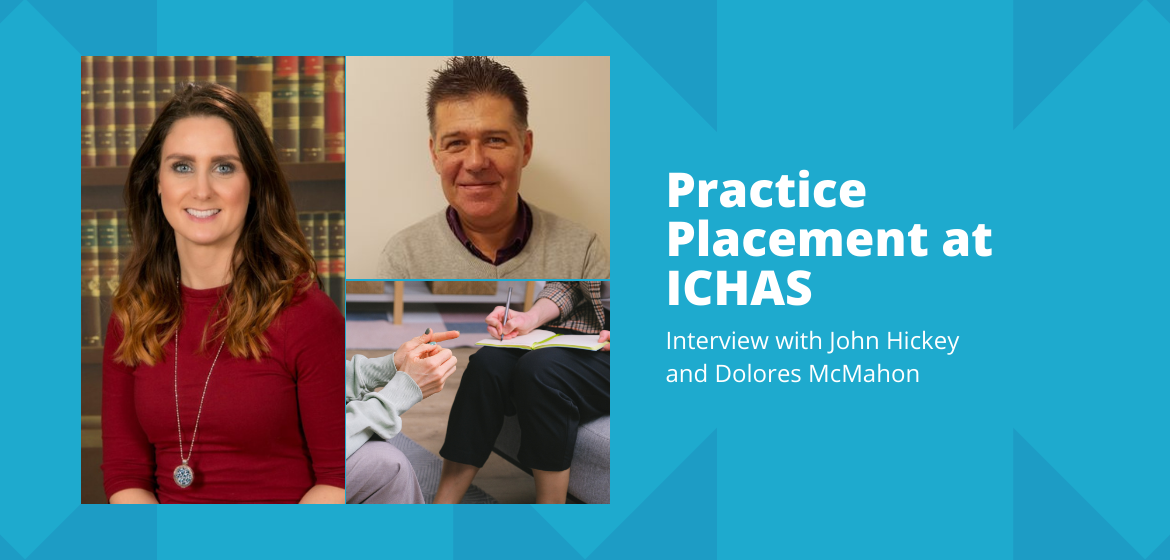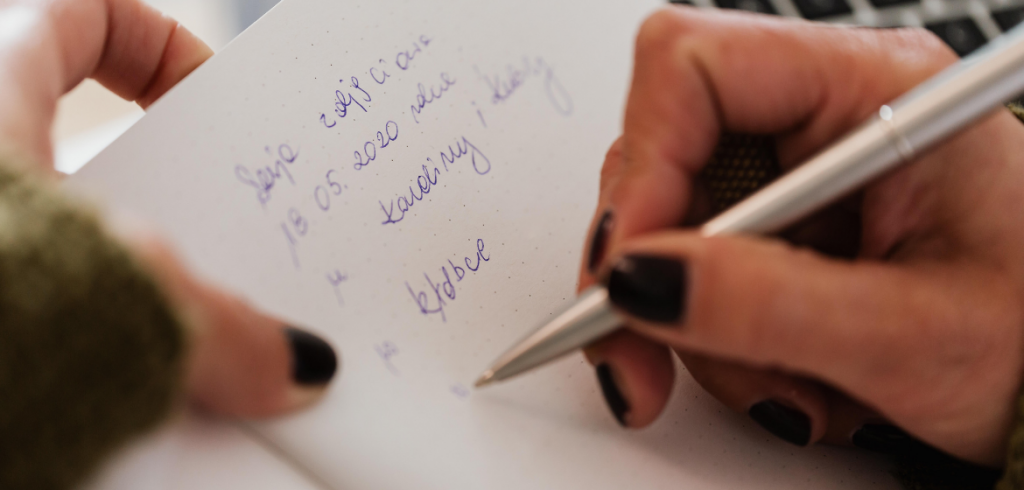
Practice Placement at ICHAS, Interview with John Hickey and Dolores McMahon
In episode two of the ICHAS Podcast, we interview John Hickey and Dolores McMahon. They are part of the practice placement team at the college. They talk about what’s involved with practice placement at ICHAS and give useful tips to students. You can hear the full interview below and on Spotify.
Thanks, John, and thanks to Dolores for joining me today. So maybe to get things started can you tell us what are your roles in the placement department?
Dolores McMahon
Thanks for having us here today. So my name is Dolores McMahon, and I work in the practice placements department at ICHAS. So my role is to work with the students and support them as much as possible when it comes to them trying to find their practice placements. A lot of that involves helping them in relation to their documentation, helping in relation to resources for contact with placement providers, and clinical supervisors, which also gives us the opportunity and myself the opportunity to liaise directly with some of the placement providers and with some of the clinical supervisors. We’re lucky to have quite a wide network of people that we get to work with as well.
John Hickey
Thanks, Dolores my name is John Hickey and I work as the clinical liaison within the college to connect with and contact potential placement providers and current placement providers that we have on our books at the moment. A big part of the role would be to ensure that the placement providers are providing the sort of the right type of environment for students going into work as student therapists. It also involves building up connections and ongoing relationships with placement providers and indeed being a support there for not only the students, but indeed the placement providers as well, should they have any queries or questions or concerns from a clinical perspective regarding some of our students, so I sort of just explained that there’s a lot of different responsibilities within the roles that we carry out. It is really trying to ensure that we keep the students, the college, and indeed the placement providers in our orbit, so to speak, and to ensure that the students get a quality experience, and the placement providers get a good experience as well as the students at the college.
When it comes to practice placement at ICHAS if you had to describe in a sentence or two how would you go about doing that?
Dolores McMahon
I think it’s best described as the outlet for how students can release their theory to practice. They do this practice placement in line with the respective modules that they do. So while they’re going out on practice placement, they’re also still studying. It allows them the opportunity to try and relate that theory to practice with the support of the lecturers, their clinical supervisors, and their placement providers. So it’s essentially them getting to go out on placement, and sit with the clients either in a group setting or on a one-to-one basis, and to be able to try and put those skills to use within that environment.
John Hickey
Yeah, absolutely. Danny, I think Dolores has hit the nail on the head. I think if we look at the undergraduate program, itself, there are major themes that run through the program, you’d look at personal development, you look at theoretical orientation, you look at applied practice, to name a few concepts that would run through the program.
It’s trying to ensure that the student takes their breadth and depth of learning and knowledge and actually then putting that into practice within the real world, really getting that experience. The same would go for the master’s students as well they will take all the theory and self-development, self-awareness, and experiential type of learning and encapsulate that and put that into a real-world perspective.
At any given time, how many students would normally be out on placement from the college?
Dolores McMahon
We could have over and above 300 students on practice placement at any one time across level seven, level eight and level nine. So it’s quite a big number of students going out on placement, we’re lucky that we do have quite a number of placement providers that we’ve worked with over the years who are familiar with our students and the programs and the requirements as well.
So there is a good number of students going out on placement every year.
You mentioned the placement providers themselves, how many would you be working with at the moment?
Dolores McMahon
So we have about 150 plus placement providers. Sometimes we can be lucky enough where more placement fighters are looking for students at that particular time, or sometimes it may be slightly reduced. But in general, we’re lucky to be able to accommodate as many students as possible with the practice placemen
With those providers what are the sectors that they’re involved in?
Dolores McMahon
So you’d have anything from addiction and counseling services to youth counseling services. You also have general mainstream counseling as well. So there will be quite a wide range, which is really good for us that we have those affiliations with those placement providers because we offer programs that are linked to a range of different areas in counselling and psychotherapy. So there is a real network of placement providers for the students to connect with out there.
John Hickey
We’ve added to that as well. Looking at the master’s program we’ve got the family therapy stream. It’s important as well, I think from a from a student perspective, and a placement perspective that we always tried to match the student’s educational and competency levels, with the type of placement provider and the type of clients that our placement providers would provide. So for example, if you’re at level seven which is generally your third year of a program, it can be your very first step into working with clients. We try to ensure that the placement providers are obviously very aware of this and they would match the client with the level of competency or experience that a student has so as to not to overwhelm the student and to make sure they don’t work outside their sort of clinical competence.
So it’s the first time they’re kind of going out into the big bad world when it comes to counseling so what kind of support do you offer to students when they’re out on placements?
John Hickey
They have a very strong supportive network, they’re very familiar with the lecturers, are very familiar with the college structure and all that that surrounds the practical supports. From a placements perspective, we’re at the end of an email or, or a phone, if something crops up for students. We’d always try to respond quite quickly and support them in whatever way that we can, and that could be anything from having some difficulty with the placement provider themselves, having some difficulty perhaps even with a client within the placement itself, or indeed, struggling to find a placement. We will do what we can to support a student, in their placement.
In that regard the student themselves also have an external supportive structure, where it’s mandatory for them to engage in clinical supervision and for every five or eight hours, depending on the program that you’re on, you have to engage with your clinical supervisor who there will be there to support you and guide you and help you through your placement process as well. So we try to do it as much as we can to make sure the student is very well supported from a very holistic perspective within the placement process.
What have you found to be the experience for the students who have been on placement?
Dolores McMahon
The feedback is always so important to us, you know, from the student’s perspective, the placement providers, and also the clinical supervisors. This allows us to assess the whole process of the work that we do as well. So it allows us to monitor as best we can and make changes where we need to, from the student’s perspective, and I’m sure John would probably agree, maybe add to it everyone has such a different experience. The learnings in the exact outcomes will obviously differ a little bit and the development too but there’s usually a difference in the students, as well as in relation to their own personal confidence.
I think in relation to a level seven student who is going out sitting in front of a client, they may come back after their 100 hours of practice patience level seven and say that their last session was very different from going out on their first session, you know, the confidence that they had, and learning about the process and procedures about being able to liaise with their clinical supervisor, all that development, all that support, I think is it is that stuff that really gets noted from the students as well.
But I definitely think, I’ve seen a growth in them professionally, and personally as well, I think it is a massive thing for us to see when they come back from their placement.
John Hickey
I suppose if there was one thing I might add to that is that I think it’s built on that word confidence. I think very much you can sort of feel that confidence of students in that they don’t become complacent with their skills because their skills are always developing. They’re always learning as they go through this process.
Knowing that they have the support, as we mentioned earlier behind them as well, that they are not alone in this, I think really does help their confidence and their ability to become a more competent practitioners.
So that’s not to say that some students will struggle or that they will find it difficult or you know, that they won’t have an absolutely positive experience. That’s a natural part of the process, too. But I think the important thing from our perspective is that they know the college is there, they know the placements department is there, and they know they’re not alone in that piece.
What would be your number one piece of advice for students when they’re going out on practice placement at ICHAS?
Dolores McMahon
I think for me, the one thing I always say to students is that before they go on their placement to allow an ample amount of time to think about where they want to go on placement and to research it and make it suit their learning needs as well. So if they’re on the addiction stream or CBT, or integrative that they find and source a practice placement that they feel will best help enhance their learning outcome.
John Hickey
From a clinical perspective I think it’s very important that students understand the program that they’ve been on for the past year or two years whatever the case might be and really absorb a theory, really understand ethics, and really be aware of good professional practice when they’re going to talk to potential placement providers so that they’re getting that message across that they’ve aligned themselves with a theory or theories, that they understand the importance of the therapeutic relationship, for example, and what all that entails.
So it’s very much trying to have confidence in your ability and understanding of your program and being able to explain to a potential provider, what it is you’ve studied, how you would apply it into practice, and being ethical and professional in all that you do.
If you want to learn more about practice placement check out our webpage today.

























